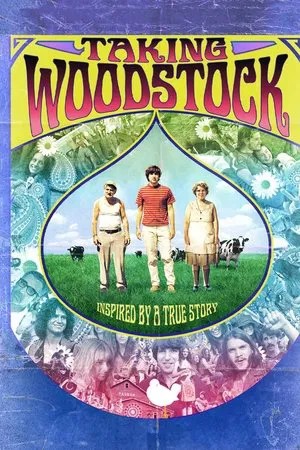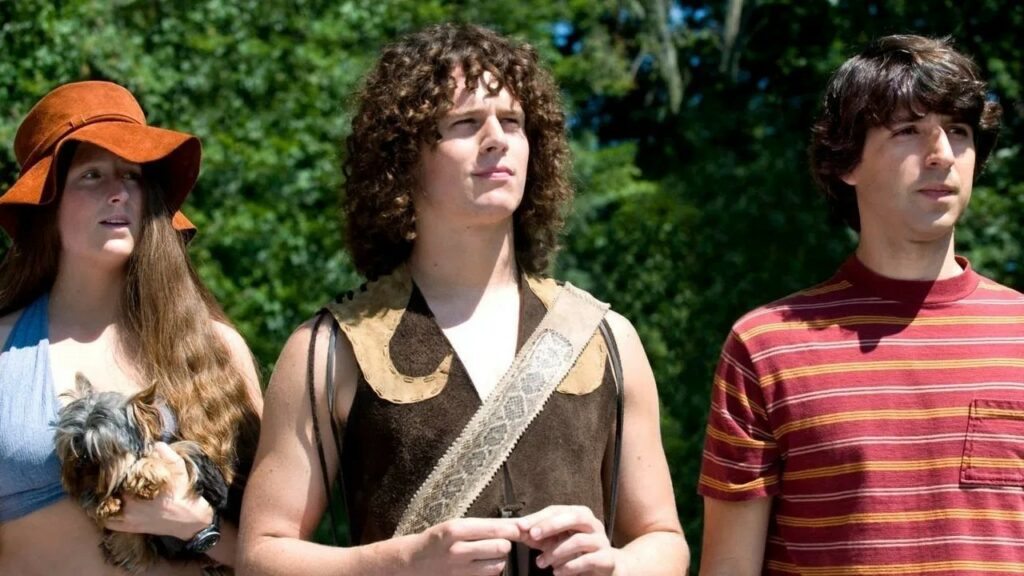
Taking Woodstock The Movie
Ang Lee’s Gentle Detour Around A Music Revolution

Ang Lee’s Gentle Detour Around A Music Revolution
Ang Lee is a filmmaker known for his versatility, tackling everything from martial arts epics and Jane Austen adaptations to intimate dramas and superhero blockbusters. So, when news broke that he was directing a film about the legendary 1969 Woodstock festival, expectations were understandably high, perhaps picturing a sweeping, music-filled panorama. Instead, Lee delivered Taking Woodstock, a decidedly different kind of film – a gentle, quirky, character-focused comedy-drama that orbits the main event rather than diving into its musical heart. Based on Elliot Tiber’s memoir, the film offers a unique, behind-the-scenes perspective, but does this sideways glance capture the spirit of the era, or does it feel like missing the main stage entirely?
The film’s story originates from the memoir Taking Woodstock: A True Story of a Riot, a Concert and a Life, co-written by Elliot Tiber and Tom Monte. Tiber, born Eliyahu Teichberg, was an aspiring interior designer living a semi-closeted gay life in Greenwich Village while spending weekends helping his struggling immigrant parents run their dilapidated motel, the El Monaco, in White Lake, New York. The memoir details his personal journey, including his experiences with the burgeoning gay rights movement and the Stonewall riots (which occurred just months before Woodstock), alongside his pivotal, almost accidental role in bringing the massive music festival to Bethel.

As president of the local Chamber of Commerce and holding the town’s only event permit, Tiber heard that the planned festival had lost its permit in nearby Wallkill. Seeing a desperate opportunity to save his parents’ failing motel, he made the fateful call to the organizers, Woodstock Ventures, inviting them to consider his town. This single act set in motion the relocation of the festival to Max Yasgur’s nearby dairy farm, inadvertently placing Tiber and his family at the epicenter of preparations for a generation-defining event. Screenwriter James Schamus, a frequent collaborator with Lee, adapted Tiber’s story, focusing on this convergence of personal transformation and historical circumstance.
Taking Woodstock wisely avoids trying to replicate Michael Wadleigh’s iconic 1970 documentary Woodstock. Instead, it uses the festival preparations as a backdrop for Elliot Teichberg’s (Demetri Martin) personal awakening. We meet Elliot trapped between his obligations to his overbearing, money-obsessed mother Sonia (Imelda Staunton) and his passively resigned father Jake (Henry Goodman) at the failing El Monaco Motel. The motel is barely scraping by, home to a troupe of eccentric, nude-prone Earthlight Players who live in the barn and rarely pay rent.
When Elliot lures Woodstock Ventures – led by the charismatic, perpetually optimistic Michael Lang (Jonathan Groff) – to White Lake, the El Monaco becomes the unlikely operational hub. The film follows the chaotic weeks leading up to the festival: the negotiations with farmer Max Yasgur (Eugene Levy), the logistical nightmares, the resistance from conservative locals who fear the influx of “hippie freaks,” and the gradual transformation of the sleepy town. Through it all, Elliot navigates his family dynamics, reconnects with his PTSD-suffering Vietnam vet friend Billy (Emile Hirsch), and encounters Vilma (Liev Schreiber), a commanding cross-dressing ex-Marine hired for security. As the festival weekend unfolds, Elliot experiences his own liberation, including a memorable LSD trip, finally finding the courage to assert his independence from his parents. The film deliberately keeps the music itself at a distance, focusing instead on the human stories unfolding on the periphery.



The film hinges on Demetri Martin’s portrayal of Elliot Teichberg, and it’s here that opinions diverge significantly. Martin, primarily known as a stand-up comedian at the time, brings a certain sweetness and awkward charm to the role. He effectively conveys Elliot’s sense of being stuck, torn between familial duty and personal desire. However, many critics found his performance somewhat muted and lacking the charisma needed to anchor a film set against such a monumental event. While his understated approach fits the character’s initial timidity, it sometimes struggles to convey the profound transformation Elliot supposedly undergoes. Some felt the portrayal, and the script’s handling of his coming-of-age and coming-out arc, was clichéd or underdeveloped.
Where the film truly shines is in its supporting cast. Imelda Staunton is predictably terrific, though perhaps controversially so, as Sonia Teichberg. She embodies the sharp-tongued, perpetually anxious, money-hoarding immigrant mother with ferocious energy, providing much of the film’s comedic friction. While some found the portrayal leaned into uncomfortable stereotypes , Staunton makes Sonia’s desperation and eventual, hash-brownie-induced loosening up memorable. Henry Goodman offers a quieter counterpoint as the long-suffering Jake, finding subtle moments of humor and warmth.
Liev Schreiber steals every scene he’s in as Vilma, the statuesque, blonde-wigged transvestite ex-Marine who provides security and surprising wisdom. It’s a performance played with dignity and strength, avoiding caricature and earning praise, even suggestions of Oscar-worthiness from some viewers. Emile Hirsch adds pathos as Billy, the troubled Vietnam vet finding solace amidst the chaos , while Eugene Levy, restraining his usual comedic persona, brings a quiet decency to Max Yasgur. Jonathan Groff captures Michael Lang’s infectious, slightly delusional optimism. This ensemble cast provides the vibrant texture that sometimes feels lacking in the central narrative.
Ang Lee reportedly saw Taking Woodstock as a chance to explore themes of liberation, tolerance, and honesty, and perhaps to lighten up after heavier films like Brokeback Mountain and Lust, Caution. His direction here is gentle, observational, and often humorous. He focuses on the human interactions and the culture clash between the conservative townies and the arriving counterculture. Lee employs techniques like split-screens, an homage to the 1970 Woodstock documentary, to capture the multifaceted chaos of the event preparations. His affection for the period and its spirit of naive optimism is evident.
Collaborating with cinematographer Eric Gautier (known for Motorcycle Diaries, Into the Wild), Lee aimed for an authentic late-60s aesthetic. Gautier conducted extensive research, even interviewing cameramen from the original documentary. They opted for a naturalistic look, often using soft focus and muted, earthy colors to evoke the period. Much of the film was shot on Super 16mm film using Arri 416 cameras, contributing to a slightly grainy, less polished texture appropriate for the era. For sequences meant to mimic archival or amateur footage, Gautier even employed older cameras like Bolex and Eclair, encouraging a less professional, more spontaneous feel from young operators to capture the “beautiful errors” reminiscent of the original documentary footage. While the daytime scenes possess a warm, lifelike quality, some darker scenes suffer from overly deep shadows. Overall, the cinematography successfully creates a specific mood – hazy, sun-drenched, and slightly dreamlike – prioritizing atmosphere over sharp, pristine visuals.
Taking Woodstock premiered at the 2009 Cannes Film Festival before its wider release in late August 2009. Critical reaction was decidedly mixed, reflected in its aggregated scores: 48% on Rotten Tomatoes (based on 179-184 reviews) and a “Mixed or Average” Metascore of 55/100 (based on 35 reviews). Audience scores were slightly more favorable, with a 6.5/10 User Score on Metacritic and a 62% rating on TMDb. IMDb users rated it around 6.7/10.
Positive reviews often praised the film’s gentle charm, humor, unique perspective, and strong supporting cast. Roger Ebert called it “a comedy with sweet interludes” and appreciated its focus on creation rather than just remembrance. Stephen Holden of The New York Times found it a “likable, humane movie” that insightfully connected Woodstock to the larger cultural shifts, including gay liberation. Michael Phillips at the Chicago Tribune enjoyed it as a “mosaic” of characters.
However, many critics found the film underwhelming, leisurely to the point of being dull, and lacking narrative drive. A major point of contention was the deliberate sidelining of the music itself, which many felt was a perverse choice for a film about Woodstock. Slate called the refusal to focus on the music “maddeningly indirect”. Others criticized the reliance on 60s clichés, the perceived weakness of the central character and performance, and the sometimes superficial treatment of complex themes. Melissa Anderson in The Village Voice dismissed it as containing “inane, occasionally borderline offensive portrayals”. Lou Lumenick of the New York Post called it an “exceedingly lame… bore”. International reviews, like those aggregated by SensaCine (Spain), also reflected this mixed sentiment, with media critics rating it 2.7/5 and users 3.0/5.
Financially, Taking Woodstock was a significant disappointment. Produced with an estimated budget of $30 million – quite substantial for what is essentially an indie character piece, albeit one with period detail and the Woodstock name attached – the film failed to recoup its costs.
It opened at #9 in the US & Canada on its debut weekend (late August 2009), earning approximately $3.46 million. Its total domestic gross ended at just under $7.5 million. International markets added only about $2.5 million, bringing the worldwide total to just under $10 million. This performance places it far below commercially successful period music films or even some of Lee’s other dramas. The substantial budget suggests Focus Features might have hoped the Woodstock connection would draw a larger audience than a typical indie dramedy. However, the film’s specific focus, light tone, lack of concert footage, and mixed reviews likely limited its appeal primarily to Ang Lee enthusiasts, fans of the specific actors, or those intrigued by the quirky premise, ultimately failing to connect with a mainstream audience looking for a more direct celebration of the festival.
Final Verdict: A Pleasant Stroll That Misses the Main Stage
Taking Woodstock is ultimately a curious and often charming cinematic detour. Ang Lee crafts a visually warm and affectionately observed portrait of a specific time and place, focusing on personal transformation amidst historical chaos. The film benefits immensely from standout supporting turns, particularly from Imelda Staunton and a scene-stealing Liev Schreiber. Its gentle humor and unique perspective on the behind-the-scenes logistics offer moments of genuine pleasure.

However, the film never quite overcomes the feeling of being peripheral. Demetri Martin’s central performance, while earnest, feels too subdued to carry the weight of the surrounding event, and Elliot’s personal journey feels somewhat conventional and less compelling than the historical backdrop. The most significant hurdle for many will be the deliberate avoidance of the music that defined Woodstock. While an understandable artistic choice to differentiate it from the documentary, it leaves the film feeling strangely incomplete, like attending a legendary party but staying in the kitchen the whole time.
Is it worth watching? For Ang Lee completists, those fascinated by the sociological aspects of Woodstock, or viewers seeking a light, character-driven period piece with strong supporting actors, Taking Woodstock offers a pleasant, if somewhat meandering, experience. It finds an appropriate home in the streaming landscape where expectations might be more aligned with its modest ambitions. But if you’re looking for the raw energy, the iconic performances, or the revolutionary spirit captured in Wadleigh’s documentary, you’ll find this gentle trip feels like it ended before reaching the main stage.
Taking Woodstock (2009) – Key Data
| Feature | Details |
|---|---|
| Director | Ang Lee |
| Year | 2009 |
| Genre | Biography, Comedy, Drama, History, Music |
| Key Cast | Demetri Martin, Imelda Staunton, Henry Goodman, Liev Schreiber, Emile Hirsch, Eugene Levy, Jonathan Groff |
| Based On | Taking Woodstock by Elliot Tiber & Tom Monte |
| IMDb Rating | 6.7/10 (approx.) |
| TMDb Rating | 62% (6.2/10) |
| Rotten Tomatoes | Critics: 48% |
| Metacritic | Critics: 55/100 |
| Budget | $30,000,000 (estimated) |
| Box Office (WW) | $9,975,737 |
| Runtime | 120 minutes |
| Distributor | Focus Features |
| MPA Rating | R (for graphic nudity, some sexual content, drug use and language) |